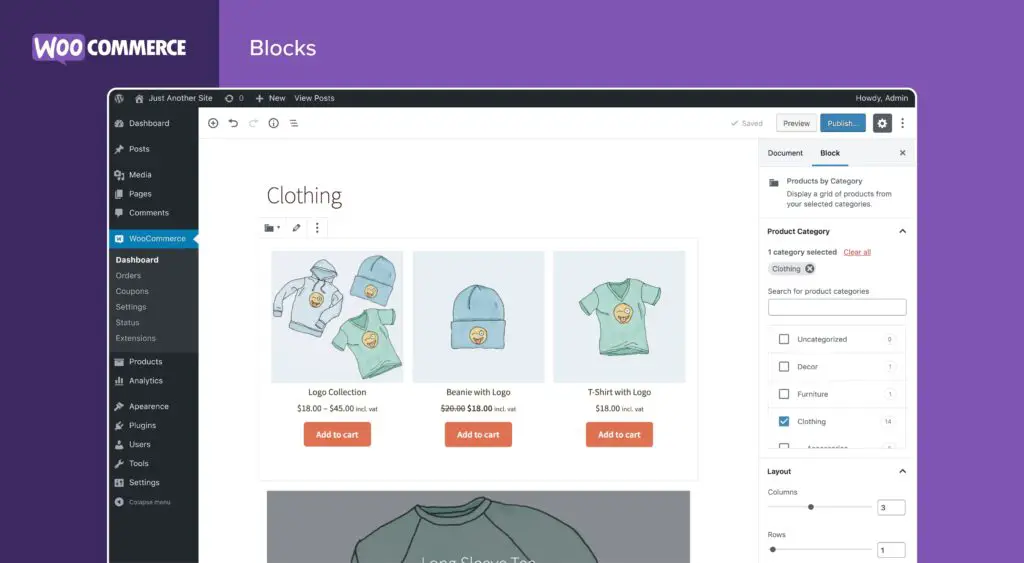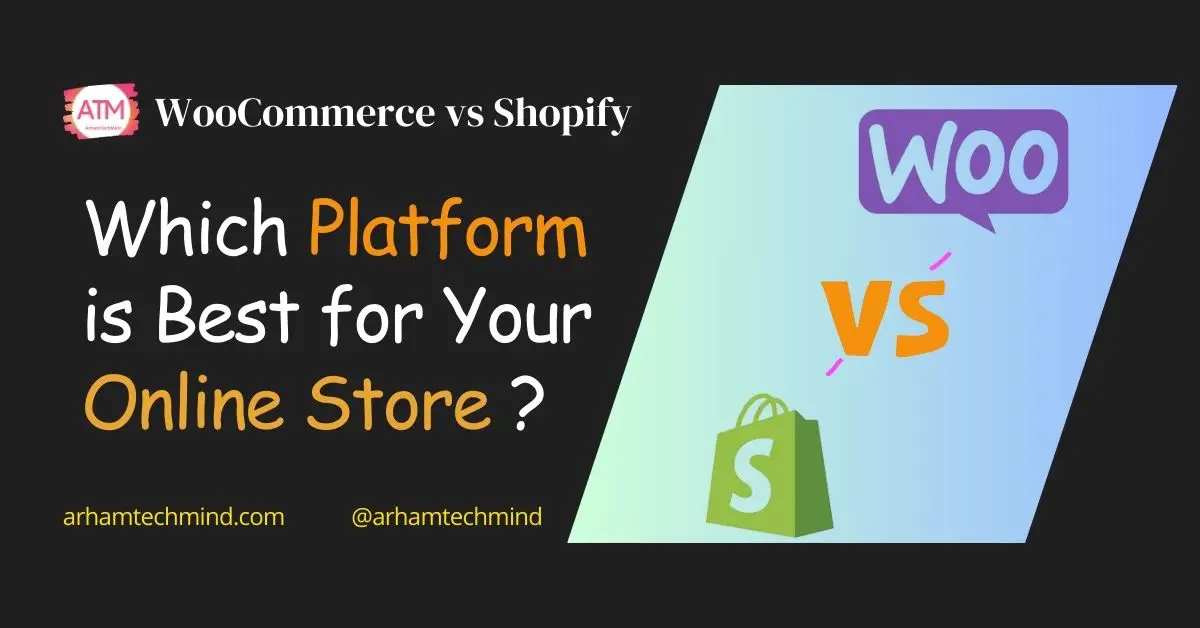Explore WooCommerce vs Shopify in this comprehensive guide. Learn which e-commerce platform best suits your online store in 2024 based on features, pricing, and scalability.
Table of Contents
ToggleIntroduction
Choosing the right eCommerce platform is crucial for your business’s success. With various options available woocommerce or shopify. WooCommerce and Shopify stand out as two of the most popular choices for creating online stores.
This article compares WooCommerce and Shopify in detail, exploring their features, pricing, ease of use, customization options, payment gateways, SEO capabilities, and more. By the end of this guide, you’ll have a clear understanding of which platform suits your business needs best.
Pros and Cons Summary
WooCommerce Pros:
- Highly customizable
- No transaction fees
- Powerful content marketing capabilities
- Large ecosystem of plugins and themes
- Full control over your data and site
WooCommerce Cons:
- Steeper learning curve
- Requires more hands-on management
- Can be less secure if not properly maintained
- Costs can be unpredictable
Shopify Pros:
- Easy to set up and use
- All-in-one solution
- Built-in scalability
- 24/7 customer support
- Regular updates and security patches
Shopify Cons:
- Transaction fees (unless using Shopify Payments)
- Less flexibility in design and functionality
- Limited access to underlying code
- Can be expensive for high-volume stores
Understanding the Basics - WooCommerce vs Shopify
What is WooCommerce?
WooCommerce, a WordPress plugin, turns any WordPress site into a fully functional eCommerce store. It offers features like inventory management, product variations, and multiple shipping options.
WooCommerce is an open-source e-commerce plugin for WordPress. Launched in 2011, it has grown to become one of the most popular e-commerce solutions worldwide providing unlimited customization possibilities with thousands of extensions.

What is Shopify?
Shopify, on the other hand, is a fully-hosted e-commerce platform that was founded in 2006. It’s an all-in-one solution that provides everything you need to create and run an online store, from hosting to payment processing.
Key Differences at a Glance
Before we delve into the details, let’s look at some key differences between WooCommerce and Shopify:
- Hosting: WooCommerce requires self-hosting, while Shopify is fully hosted.
- Platform: WooCommerce is a WordPress plugin, Shopify is a standalone platform.
- Ease of Use: Shopify is generally easier for beginners, while WooCommerce has a steeper learning curve.
- Customization: WooCommerce offers more flexibility and customization options.
- Costs: WooCommerce can be cheaper to start but may have higher long-term costs, while Shopify has predictable monthly fees.
Detailed Comparison
1. Ease of Setup and Use
WooCommerce
Setting up WooCommerce requires a few more steps:
- Purchase hosting and a domain name
- Install WordPress
- Install and activate the WooCommerce plugin
- Configure your store settings
While this process isn’t overly complex, it does require some technical know-how and can be intimidating for complete beginners.
Shopify
Shopify’s setup process is more straightforward:
- Sign up for a Shopify account
- Choose a theme
- Add your products
- Configure your payment gateway
Shopify’s user-friendly interface and guided setup make it accessible even to those with little to no technical experience.
Winner: Shopify –
Its all-in-one nature and user-friendly interface make it easier for beginners to get started quickly.

2. Design and Customization
WooCommerce
WooCommerce leverages the vast WordPress ecosystem, offering:
- Thousands of themes (both free and premium)
- Endless customization possibilities through coding
- Ability to modify every aspect of your store’s look and functionality
If you have coding skills or are willing to hire a developer, WooCommerce allows for unlimited customization.
Shopify
Shopify offers:
- A selection of professional, responsive themes
- An intuitive drag-and-drop editor
- The ability to edit HTML and CSS (on higher-tier plans)
While Shopify’s customization options are robust, they’re more limited compared to WooCommerce, especially without coding knowledge.
Winner: WooCommerce – Its flexibility and access to the entire WordPress ecosystem give it an edge in terms of design possibilities.
3. Features and Functionality
WooCommerce
WooCommerce’s feature set includes:
- Unlimited products and categories
- Full control over data and content
- Extensive plugin ecosystem for added functionality
- Advanced SEO capabilities (leveraging WordPress SEO plugins)
- Content marketing tools (blogging, etc.)
Shopify
Shopify comes with:
- Built-in features for most e-commerce needs
- Abandoned cart recovery
- Multi-channel selling (social media, Amazon, etc.)
- Shopify POS for in-person selling
- 24/7 customer support
Both platforms offer robust feature sets, but they cater to slightly different needs.
Winner: Tie – WooCommerce wins for flexibility and content marketing, while Shopify edges ahead for built-in e-commerce specific features.
4. Payment Options and Transaction Fees
WooCommerce
- Supports numerous payment gateways
- No transaction fees (apart from payment processor fees)
- Requires setting up payment gateways manually
Shopify
- Offers Shopify Payments (powered by Stripe)
- Charges transaction fees unless you use Shopify Payments
- Supports multiple external payment gateways
Winner: WooCommerce – No transaction fees and more flexibility in payment gateway choices give it a slight edge.

5. Pricing and Ongoing Costs
WooCommerce
Free to install, but costs include:
- Hosting (varies, but can start around $5/month)
- Domain name ($10-$15/year)
- SSL Certificate (often included with hosting)
- Premium themes and plugins (optional, but can add up)
Shopify
- Tiered pricing plans:
- Basic Shopify: $29/month
- Shopify: $79/month
- Advanced Shopify: $299/month
- Includes hosting, SSL, and core features
Winner: Depends – WooCommerce can be cheaper to start, but costs can vary widely. Shopify offers more predictable pricing.
6. Scalability - Performance and Speed
WooCommerce
WooCommerce Performance: WooCommerce’s performance depends on your hosting provider. With the right setup, it can be lightning-fast, but poorly optimized sites can suffer from slow loading times.
- Highly scalable due to its open-source nature
- Requires manual management of hosting resources as you grow
- Can handle high-traffic sites with proper configuration
Articles on Speed Performance
Shopify
Shopify Performance: Shopify’s hosted solution means its servers are optimized for speed and performance, providing fast loading times out of the box. It’s designed to handle high traffic, making it a reliable choice for busy stores.
- Built to scale seamlessly
- Automatically handles increased traffic and sales
- May require upgrading to higher-tier plans for advanced features
Winner: Shopify – Its built-in scalability and managed hosting make it easier to grow without technical headaches.
7. SEO Capabilities
WooCommerce
WooCommerce, running on WordPress, benefits from advanced SEO plugins like Yoast SEO, making it easy to optimize product pages, meta descriptions, and more.
- Leverages powerful WordPress SEO plugins like Yoast
- Full control over all SEO elements
- Excellent for content-driven SEO strategies
Shopify
Shopify provides built-in SEO features like customizable title tags and meta descriptions. However, its structure can be less flexible compared to WooCommerce, which offers more control over SEO customization.
- Built-in SEO features
- Automatic sitemap generation
- Customizable title tags, meta descriptions, and URLs
Winner: WooCommerce – The flexibility of WordPress and its SEO plugins give WooCommerce an advantage for advanced SEO strategies.
Must Read Articles on SEO
8. Integrations and Add-ons
WooCommerce
WooCommerce boasts thousands of integrations with marketing tools, payment processors, and other apps. Its open-source nature means you can integrate virtually anything, allowing for a highly personalized setup.
Shopify
Shopify’s app store offers a wide variety of integrations, including popular marketing, accounting, and inventory management tools. While extensive, Shopify’s closed ecosystem means some integrations may have limitations compared to WooCommerce.
Winner: wooCommerce– You can integrate virtually anything, allowing for a highly personalized setup.
9. Support and Community
WooCommerce
- Large, active community of users and developers
- Extensive documentation and tutorials available
- Support mainly through forums and third-party developers
Shopify
- 24/7 customer support via phone, email, and chat
- Extensive help center and documentation
- Active community forums
Winner: Shopify – Its dedicated, round-the-clock support gives it an edge, especially for beginners.
10. Security and Support
WooCommerce
Security in WooCommerce depends on your hosting provider. It’s essential to keep plugins and themes updated to avoid vulnerabilities. Support is primarily community-driven, though there are premium support options available.
Shopify
Shopify provides SSL certificates, PCI compliance, and regular security updates. The platform offers 24/7 support through chat, email, and phone, making it a more secure and supportive option.
Winner: shopify– Security is one of Shopify’s strong points, especially for those without technical expertise.
Must Read Articles on Security
Who Should Choose WooCommerce?
WooCommerce is ideal for:
- Those who already have a WordPress site and want to add e-commerce functionality
- Businesses that prioritize content marketing alongside their online store
- Store owners who need extensive customization options
- Those comfortable with (or willing to learn) some technical aspects of website management
Who Should Choose Shopify?
Shopify is perfect for:
- E-commerce beginners who want an easy-to-use, all-in-one solution
- Businesses focused primarily on selling products rather than content creation
- Store owners who prefer a hands-off approach to technical management
- Those who value 24/7 support and are willing to pay for it
Which ecommerce Platform is Best for Small Businesses?
WooCommerce for Small Businesses:
WooCommerce can handle large-scale stores, but it requires robust hosting and expert management. It’s best for businesses that need extensive customization and have the resources to manage a complex setup.
Shopify for Small Businesses:
Shopify’s enterprise solution, Shopify Plus, is built for high-volume businesses. It offers a scalable, managed service that can handle millions of transactions, making it an excellent choice for big brands.
Which ecommerce Platform is Best for Large Enterprises?
WooCommerce for Small Businesses:
WooCommerce is ideal for small businesses that want complete control over their store’s design and functionality. It’s cost-effective and highly customizable, but it does require some technical skills.
Shopify for Small Businesses:
Shopify’s ease of use and dedicated support make it perfect for small business owners who want to get up and running quickly without dealing with technical hassles. However, the ongoing costs can be a consideration.
Conclusion
Both WooCommerce and Shopify are excellent ecommerce platform, each with its own strengths and weaknesses. The best choice for your online store depends on your specific needs, technical skills, and long-term goals.
Choose WooCommerce if you value flexibility, have some technical knowledge (or are willing to learn), and want complete control over your online store. It’s especially suitable if content marketing is a significant part of your strategy.
Opt for Shopify if you prefer an easy-to-use, all-in-one solution with reliable support and don’t mind sacrificing some flexibility for convenience. It’s ideal for those who want to focus on selling products without worrying about the technical aspects of running an online store.
Remember, the success of your online store depends not just on the platform you choose, but also on your products, marketing strategies, and customer service. Whichever platform you select, focus on creating value for your customers, and success will follow.
FAQ
- Q: Can I migrate from WooCommerce to Shopify or vice versa? A: Yes, it’s possible to migrate between platforms, but it can be a complex process. Both platforms offer migration tools and services to help with the transition.
- Q: Which platform is better for dropshipping? A: Both platforms support dropshipping, but Shopify has a slight edge with its seamless integration with dropshipping apps like Oberlo.
- Q: Do I need coding skills to use WooCommerce or Shopify? A: You don’t need coding skills for basic setup and use of either platform. However, coding knowledge can be beneficial for advanced customization, especially with WooCommerce.
- Q: Can I use my own domain name with both platforms? A: Yes, both WooCommerce and Shopify allow you to use your own domain name.
- Q: Which platform offers better security? A: Both can be secure. Shopify handles security for you, while with WooCommerce, security is partly your responsibility (though many hosting providers offer robust security features).
- Q: Are there transaction fees on WooCommerce and Shopify? A: WooCommerce doesn’t charge transaction fees, but your payment gateway might. Shopify charges transaction fees unless you use Shopify Payments.
- Q: Can I sell digital products on both platforms? A: Yes, both WooCommerce and Shopify support the sale of digital products.
- Q: Which platform is better for international selling? A: Both platforms support international selling. Shopify has built-in features for multiple currencies and languages, while WooCommerce requires plugins for these functionalities.
- Q: Can I run a blog alongside my store on both platforms? A: Yes, but WooCommerce (being a WordPress plugin) has a natural advantage for extensive blogging and content marketing.
- Q: Which platform offers better analytics? A: Both offer robust analytics. Shopify has built-in analytics, while WooCommerce can leverage various WordPress analytics plugins for deep insights.

